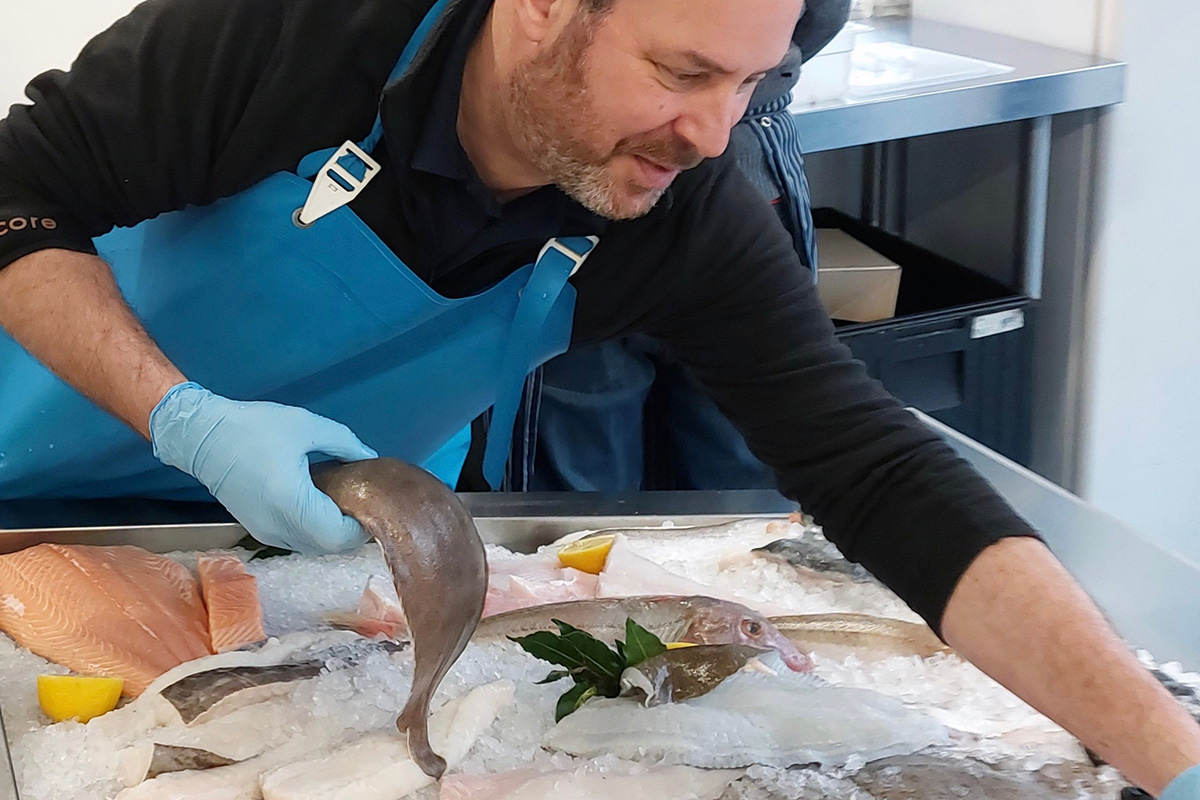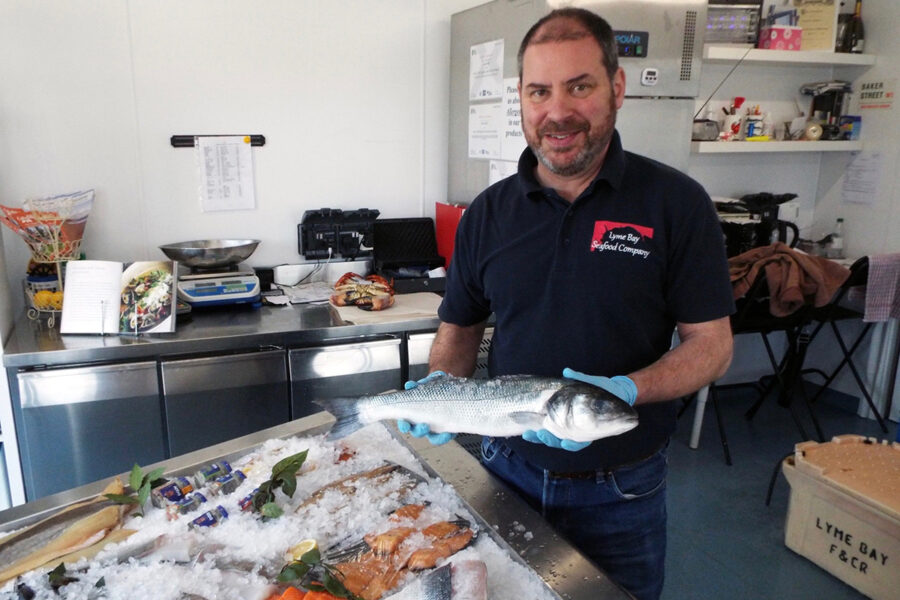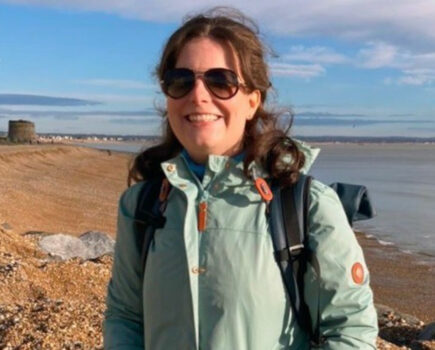“We started the business in 2021. A lot of the Covid-19 restrictions were still in place – people didn’t like going to supermarkets and were shopping more locally,” Simon Baker, founder of Lyme Bay Seafood Company, told Fishing News. “I was 48 at the time. It was a point in my life where I thought, if I’m going to do it, I’m going to do it now.”
Simon’s passion for seafood began when he was growing up in Pinner, Middlesex. “It all started when I was about 14 years old. I used to finish my paper round and watch my local fishmonger’s set up for the day – putting out this amazing array of different-coloured fish and shellfish.
“Then, at school, we had to do work experience. Everyone was going off to building societies and estate agents – and I knew that wasn’t for me. So I arranged to do my work experience at the fishmonger’s. At the end of the week, they paid me £25 and offered me a job. I ended up spending five years there.”
Simon later went on to work for a number of businesses in the retail food sector, from running
a pub to being a general manager for a pie and pasty company. However, his lifelong passion for all things fish eventually drew him back to the seafood industry.
Located in the small town of Colyton, East Devon, just a couple of miles inland from Lyme Bay, the business aims wherever possible to supply local, sustainably sourced fish and shellfish to both retail and commercial customers. It also specialises in its own range of smoked fish, produced from an onsite smoking shed.

Simon setting up the slab. A typical day sees him take on a variety of tasks – with the exception of running the business’ social media accounts. “I gave up on doing the social media about 18 months ago. I’m rubbish at it – and it takes an inordinate amount of time. That’s two good reasons for me not to do it. I now use a local business – which comes in with a proper camera and takes various photos and bits of video.”
With the shop opening at 9am, Simon’s day gets off to a busy start. “My typical day begins with getting the fish prepped for the counter. We’ve got a good old- fashioned fish slab here which we fill with ice, and then I’ll set that up.
“We buy from Brixham market, as well as from local guys like John Wallington. We get lobsters and shellfish off another local fisherman, and try our best to sell only hand-dived scallops. We also supply local Lyme Bay rope-grown mussels.
“When buying from Brixham, we always try and source day- boat fish as much as possible. It’s all on computer these days, with fish graded into different sizes and methods of catch – so you can deliberately buy fish off day- boats, and specifically individual boats if you know the boat well. So I’ll try and target boats local to Lyme Bay.
“Another task in the morning is to prepare both retail orders and the commercial ones – things like cod and hake for pubs. We also pick our own crab and cut our own scallops – that does take a bit of a chunk of my day as well.”
With the counter set up, orders prepped and the shop open, Simon’s focus turns to smoking. “A lot of my time is filled up with prepping and getting the smoke done.
“If we’re cold-smoking we’ll use whitefish – predominantly haddock. We fillet it and use a mixture of sugar and salt for the cure. We’ll then rinse it and get the fish dried. The smoking process works a lot better when the fish isn’t wet – so we dry the surface off in the fridge. That then goes in the smoker for four to five hours, depending on the size of the fillets.
“We use what’s called little ‘biscuits’ – compacted wood dust. For the whitefish, we’ll use oak – that’s a heavier smoke, which gives the fish a really nice colour and flavour.”
As well as cold-smoking, Simon also hot-smokes a range of products. “We do mackerel and trout fillets – which we get from a family-run business based in Dorset. It’s the same process – cut into fillets, salt and sugar cure – but with hot-smoking, you’re cooking the fish at the same time as smoking it.
“We get a lot of repeat business from our smoked products. We’ve been told many a time that the smoked haddock is the best people have ever tried – which is some commendation.”

Simon completed the first level of the Master Fishmonger Standard in 2021, and is looking to achieve the next stage this winter. “Whatever role I’ve been in, I’ve always believed it’s important to have that official standard. People can recognise the fact that you are trained for what you do – and that you’re good at what you do. The certificate on the wall in the shop is a good thing to have.”
Simon – who runs the business with just the help of his wife Monica – also makes sure to spend time with retail customers.
“I enjoy talking about seafood. We get lots of people come in who have no idea what they want, and tell me they’re rubbish at cooking fish. So I’ll talk them through what to do. People tend to become more confident over time. I’ll say to start with a plaice fillet or loin of cod, or perhaps hake. Then move on to something else – a bit of gurnard or John Dory.”
With late afternoon approaching, Simon begins his end-of-day tasks. “We have a rough idea of what we’re going to sell throughout the day. I’ll try and keep fish on the bone as long as possible – I think it keeps it fresher. So I’ll prep what I think we need for the day ahead, so we’re only carrying a minimal amount over to the next day.
“Then it’s just a process of cleaning down throughout the shop.”
This story was taken from the latest issue of Fishing News. For more up-to-date and in-depth reports on the UK and Irish commercial fishing sector, subscribe to Fishing News here or buy the latest single issue for just £3.50 here.
Sign up to Fishing News’ FREE e-newsletter here.








